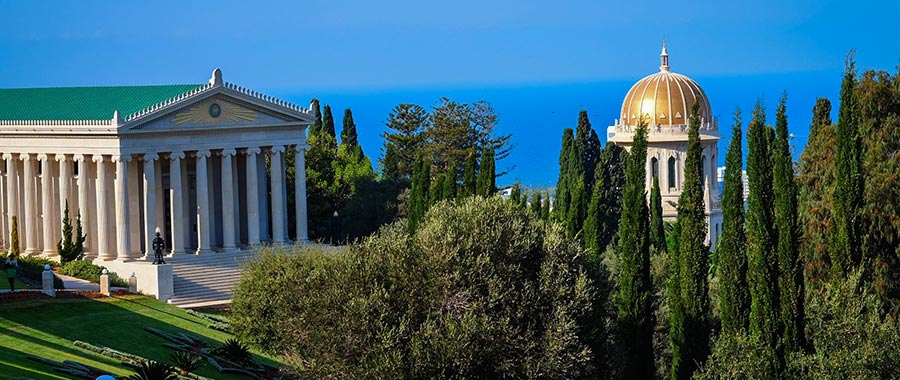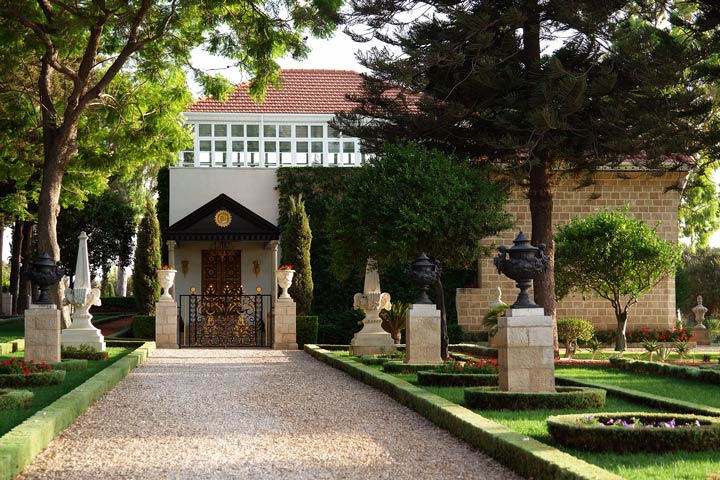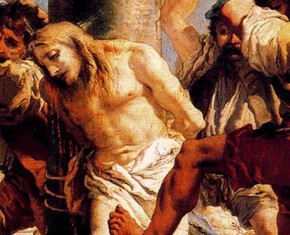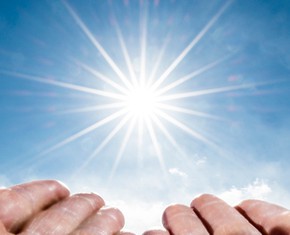The views expressed in our content reflect individual perspectives and do not represent the authoritative views of the Baha'i Faith.
My husband and I recently celebrated our 30th wedding anniversary. As I reflect on this milestone in my own life, I am recalling where and when we were married—and a very special event that occurred at about the same time.
A bit of background: in April, 1986, I traveled to Haifa, Israel to volunteer for a one-year project at the Baha’i World Centre. Toward the end of that year, I agreed to stay for another eight months to assist with an upcoming event—the International Baha’i Convention. As it turned out, during those eight months John (also a volunteer there) and I met and married. When we left in 1994, our eight years in Haifa had encompassed two International Conventions.
This extraordinary event, held every five years, brings together members of National Spiritual Assemblies from around the world. Having been elected by the Baha’is in their home country, during their time in Haifa they have the honor as well as the responsibility of electing nine men to serve as members of the Universal House of Justice, the international governing body of the Baha’i Faith:
Baha’u’llah conferred authority upon the Universal House of Justice to exert a positive influence on the welfare of humankind, to promote education, peace and global prosperity, and to safeguard human honour and the position of religion. It is charged with applying the Baha’i teachings to the requirements of an ever-evolving society and is thus empowered to legislate on matters not explicitly covered in the Faith’s Sacred Texts. The guidance provided by the Universal House of Justice ensures unity of thought and action in the Baha’i community as it learns to translate into reality Baha’u’llah’s vision for a spiritually and materially prosperous global civilization.
Even as I write this, another International Convention has just occurred. I can visualize thousands of delegates, many in their native dress, arriving in a colourful swirl of vibrating energy, truly united in love, service, joy, and humility.
They began by visiting Holy Places in Haifa and nearby Akka. I know this first-hand, because in both 1988 and 1993 I was privileged to serve as a bus escort and guide. I remember many ways they reacted to arriving at places that directly connect to the history of the Baha’is in the Holy Land. For example, some embraced each site with a burst of energy; some were slow and deliberate as they walked from the bus; some held back, as if wondering if they were worthy of the visit; some assisted others in their walking. Indeed, the many ways people expressed themselves both physically and verbally was a lesson to me both as observer and as their helper.
At last the day arrived for the primary purpose of the Convention: the election of the Universal House of Justice. With each nation being called to vote in alphabetical order, and each delegate having their own moment to deposit their ballot on the stage of the vast auditorium, the process took several hours. But time flew by as observers such as myself watched from the balcony. It reminded me of a parade of flowers, each different yet an integral piece of a celestial garden.
I thought about the fact that there are millions of Baha’is around the world. Every year at the grassroots level we elect our own Local Spiritual Assemblies; we also elect delegates who in turn elect National Spiritual Assemblies. Finally, every five years those members elect the Universal House of Justice. That essentially spiritual process does not even remotely resemble elections as we see them in civic society; there are no nominations, campaigning, partisanship, or politicking.
Shoghi Effendi, the Guardian of the Baha’i Faith and great-grandson of Baha’u’llah, advised electors:
… to consider without the least trace of passion and prejudice, and irrespective of any material consideration, the names of only those who can best combine the necessary qualities of unquestioned loyalty, of selfless devotion, of a well-trained mind, of recognized ability and mature experience. – This Decisive Hour, p. 157.
Yet another day of the Convention featured consultation among the delegates. Individuals shared news, asked questions, made announcements, or sought assistance in an array of matters. I was fascinated to hear their concerns, and I was thrilled to learn of their achievements.
I will never forget the day that the election results were announced. When the names of the nine members were read, applause and joyful cheers thundered through the room as we rose to greet and welcome the Universal House of Justice. Some had been re-elected, and some were newly called to serve. In either case, we knew they had been elected solely on the basis of their character and capacity to serve. There would be no personal gain, no material advantage. In fact, personal sacrifice is often required. But they would all serve as elected—meeting the challenges and surpassing what most of us would consider human limitations.
As I write this, I am also thinking about the fact that every year within the 12 Days of Ridvan, which commemorate Baha’u’llah’s declaration of his mission as God’s messenger, the Universal House of Justice sends a letter to the Baha’is of the World. Always loving, always encouraging, it is also clear in its intent. I feel so fortunate to be connected to others and to our international governing body in such a direct, personal way. When the letter arrives, it inspires a renewed desire to serve and to re-focus on what needs to be done—all in service to humanity and the world we share.
Cover photo courtesy of Maani Safa.

















Comments
Sign in or create an account
Continue with Googleor